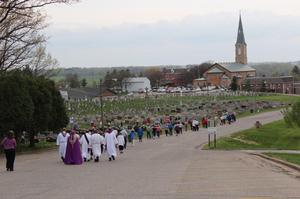Sacred Liturgy & Sacraments: May 2013 Archives


Just before Ascension Thursday, there are three days of prayer asking God to bestow his blessing on creation, particularly the on farms that produce the food we need for nourishment. We call these days minor Rogation Days, in comparison to the major Rogation Day is observed on April 25. "Rogation" comes from the Latin rogare, to ask, as in, to ask for God's mercy, His blessings, His continued benevolence upon all creation. Whether major or minor days of asking, Christians have been doing this type of prayer since the time of Saint Gregory the Great (the major day) and Saint Mamertus (the minor days). This is good example of how we Christians connect trust and confidence in God and the work of human hands on the earth.
A Catholic sense of ecology always includes prayer and not merely a commitment to a green ideology. All of our thinking and acting is informed by our prayer, work and prayer, faith and reason. From a gesture of gratitude we give thanks to the Lord for the beauty of the earth. The key biblical passages prayed come from Psalm 69, Jeremiah 10-11: 1-16, James 5:16-20 and Luke 11:5-14.
In the Northeast we don't see too much of Rogation Day observances with Mass, litanies and processions. Sad to see so little done in this area since there are lots of working farms here and it would be a good thing to make supplication to God. In the Midwest can be experienced. Farmers, gardeners, agricultural professionals and others, gather to pray for all who work on the land, for a favorable planting, growing, and harvesting season, and for safety and protection from natural disasters.
Some of the Benedictine monasteries will attend to Rogation Days in collaboration with the local pastor or bishop. In 2012, the Benedictine Sisters of St Benedict Monastery (Ferdinand, IN) for example, had a procession that went from their monastery to the local parish with Bishop Charles C. Thompson, bishop of the Diocese of Evansville. Offices of Catholic Rural Life in certain dioceses ought to be attentive to this ancient form of prayer.
Some places to read further: here and here (with a very good history of the Rogation Day practice).



